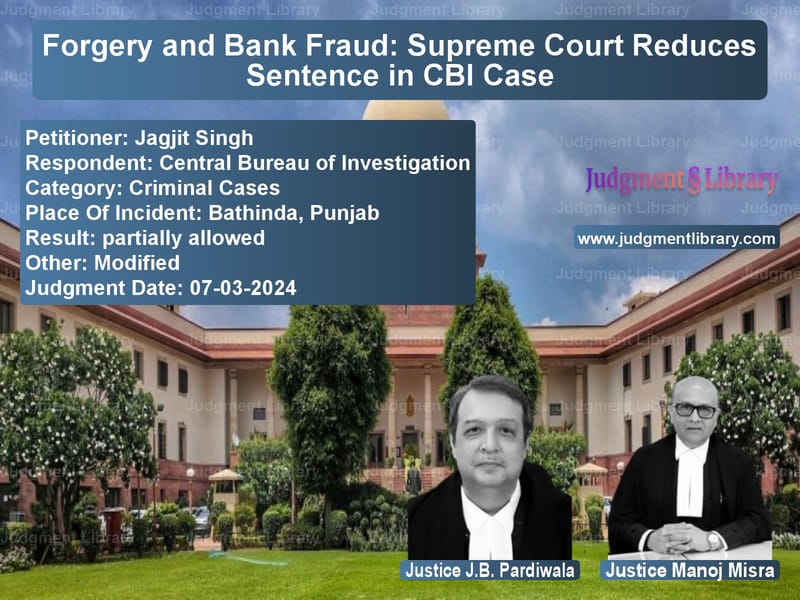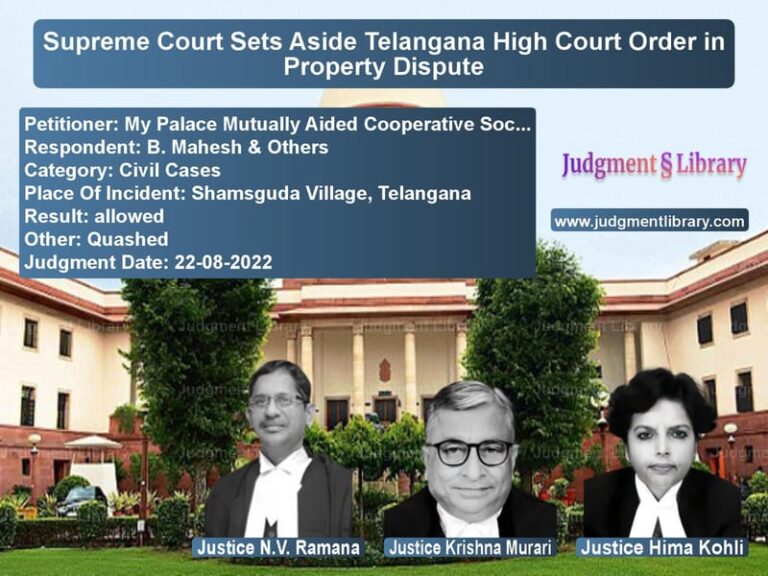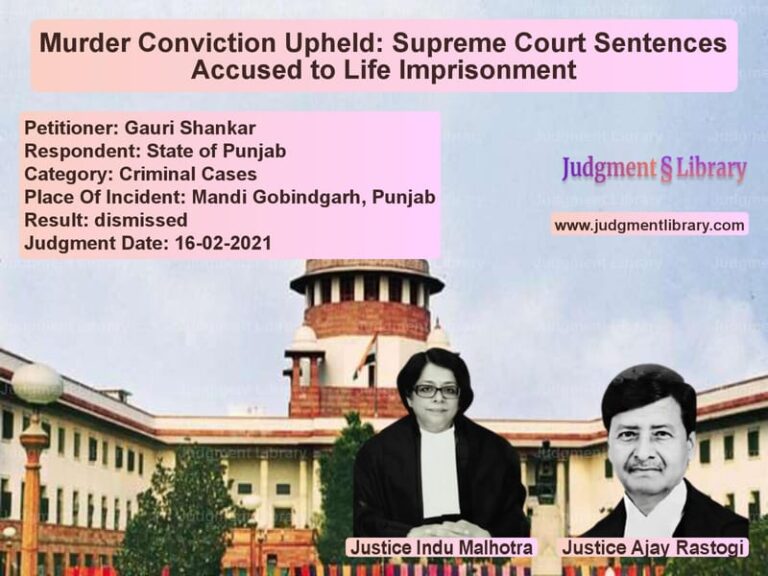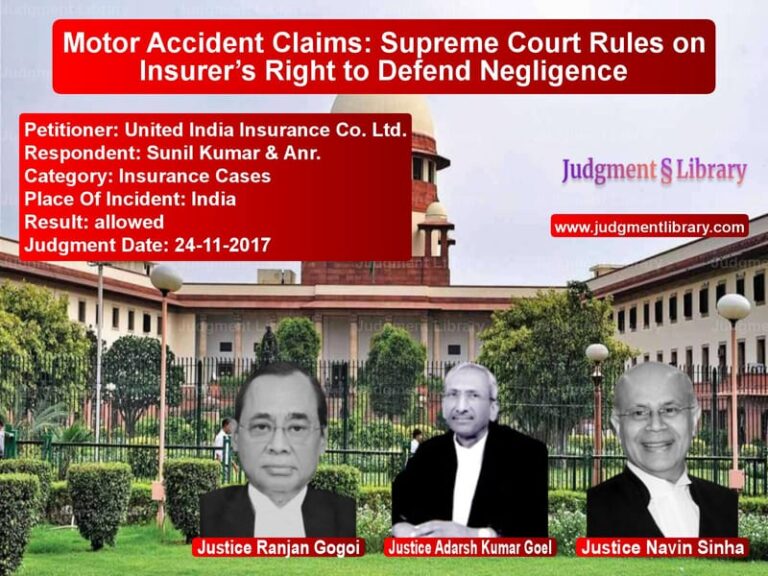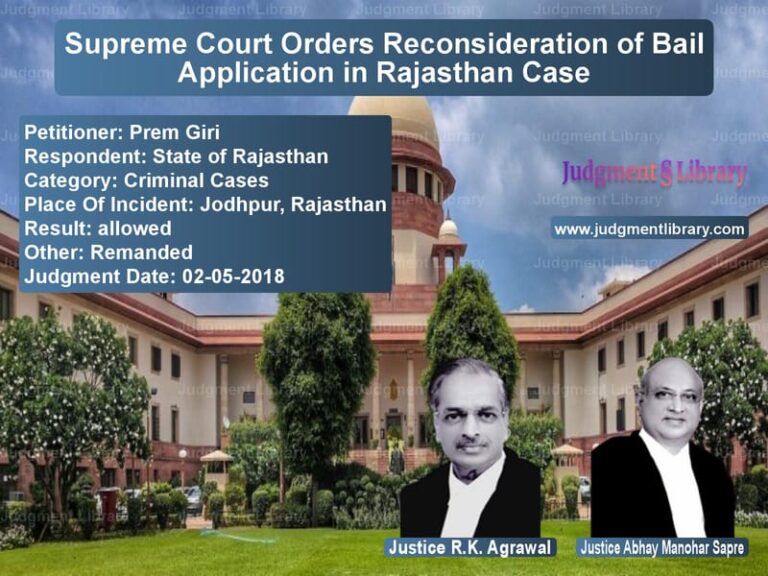Forgery and Bank Fraud: Supreme Court Reduces Sentence in CBI Case
The Supreme Court of India has recently ruled on a high-profile case involving bank fraud and forgery in Jagjit Singh vs. Central Bureau of Investigation. The case, spanning several decades, highlights the misappropriation of bank funds through fraudulent vehicle loans and raises critical questions about criminal liability, mitigating circumstances, and the extent of sentencing in white-collar crimes.
Background of the Case
The case originated in the late 1980s when the accused, Jagjit Singh, who was serving as a Sales Manager at M/s Oriental Motors, Bathinda, Punjab, was implicated in a conspiracy to defraud Punjab and Sind Bank, Sangha. The prosecution alleged that Singh, in collaboration with other co-accused, secured vehicle loans fraudulently by creating fictitious sales records. The fraud amounted to Rs. 8,30,000, which was misappropriated instead of being used for the intended purchase of vehicles.
Prosecution’s Allegations
The case against Singh and his co-conspirators was built on the following allegations:
- Between 1987-88, the accused conspired with bank officials to secure vehicle loans under fictitious names.
- Loan applications were submitted in the names of ten individuals who were illiterate and had no knowledge of the loans.
- The accused prepared false invoices, showing vehicle sales that never took place.
- The sanctioned loan amounts were credited to the company’s account and subsequently withdrawn by the accused.
- The fraudulent loans were facilitated by the bank manager, who approved them without due diligence.
Based on these allegations, the Central Bureau of Investigation (CBI) registered a case under the following sections:
- Section 120B (Criminal Conspiracy) of the IPC
- Section 420 (Cheating and Dishonest Inducement of Property) of the IPC
- Section 467 (Forgery of Valuable Security) of the IPC
- Section 468 (Forgery for Purpose of Cheating) of the IPC
- Section 5(1)(d) and Section 5(2) of the Prevention of Corruption Act, 1988
Trial Court’s Conviction
After a detailed trial, the Special Judge, CBI, Patiala, convicted Jagjit Singh and sentenced him to:
- 120B IPC: Two months rigorous imprisonment with a fine of Rs. 2,000.
- 420 IPC: Two years rigorous imprisonment with a fine of Rs. 3,000.
- 467 IPC: Two years rigorous imprisonment with a fine of Rs. 1,000.
- 468 IPC: Two years rigorous imprisonment with a fine of Rs. 1,000.
The trial court ruled that all sentences would run concurrently.
High Court’s Ruling
Jagjit Singh appealed to the Punjab and Haryana High Court, which upheld the conviction, affirming that:
- The appellant played an active role in the conspiracy.
- He introduced the fake loanees to the bank and ensured their applications were approved.
- He created false invoices and deposited the loan amounts into the company’s account.
- There was conclusive evidence that no vehicles were delivered, proving the fraud.
Arguments Before the Supreme Court
Arguments by the Appellant (Jagjit Singh)
Before the Supreme Court, Singh’s counsel made the following arguments:
- His role was minor compared to other accused, and he acted under instructions from his superiors.
- He had no personal gain from the fraud.
- He comes from a poor background, is elderly, and has no means of livelihood.
- His wife, a retired teacher, is his only financial support, and both suffer from chronic health conditions.
- His children live separately, leaving him with no family support.
Arguments by the Respondent (CBI)
The CBI countered these claims, asserting that:
- Singh was an integral part of the fraud and willingly participated.
- The fraud could not have been executed without his direct involvement.
- Sentencing should reflect the gravity of the crime and serve as a deterrent against banking fraud.
Supreme Court’s Judgment
The Supreme Court carefully examined the case and upheld the conviction, ruling that:
“We are convinced with the line of reasoning adopted by the Trial Court as well as by the High Court in holding the appellant guilty of the alleged crime. No interference is warranted so far as conviction is concerned.”
However, considering the mitigating factors, the Court exercised leniency in sentencing:
“Keeping in mind the mitigating circumstances of the appellant convict herein as narrated above, we reduce the sentence of the appellant to the period already undergone. His bail bond stands discharged.”
Implications of the Judgment
This ruling has important implications:
- Confirms strict action against banking fraud: The judgment reinforces that financial fraud involving banks will be taken seriously.
- Upholds the principle of proportional punishment: While the crime was serious, the Court considered the personal circumstances of the convict.
- Balances justice with compassion: The Supreme Court acknowledged the accused’s age, health issues, and financial hardship.
- Sets a precedent for white-collar crimes: Courts may consider an offender’s socio-economic background while deciding sentencing.
The ruling ensures that while criminals are held accountable, they are not excessively punished when circumstances warrant leniency.
Petitioner Name: Jagjit Singh.Respondent Name: Central Bureau of Investigation.Judgment By: Justice J.B. Pardiwala, Justice Manoj Misra.Place Of Incident: Bathinda, Punjab.Judgment Date: 07-03-2024.
Don’t miss out on the full details! Download the complete judgment in PDF format below and gain valuable insights instantly!
Download Judgment: jagjit-singh-vs-central-bureau-of-in-supreme-court-of-india-judgment-dated-07-03-2024.pdf
Directly Download Judgment: Directly download this Judgment
See all petitions in Fraud and Forgery
See all petitions in Theft and Robbery Cases
See all petitions in Judgment by J.B. Pardiwala
See all petitions in Judgment by Manoj Misra
See all petitions in partially allowed
See all petitions in Modified
See all petitions in supreme court of India judgments March 2024
See all petitions in 2024 judgments
See all posts in Criminal Cases Category
See all allowed petitions in Criminal Cases Category
See all Dismissed petitions in Criminal Cases Category
See all partially allowed petitions in Criminal Cases Category

